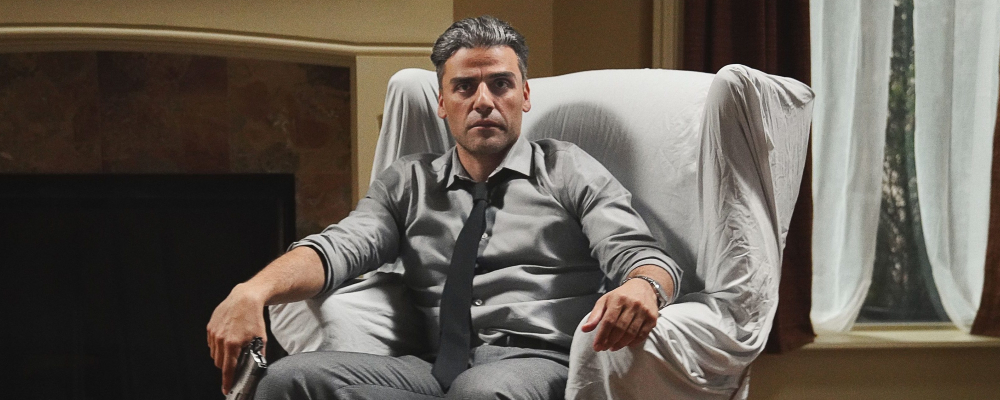For a film called The Card Counter, Paul Schrader’s latest has very little interest in games of chance.
William Tell (Oscar Isaac; self-contained, slicked-back hair), the eponymous card counter, is a creature of habit; in part a holdover from his time in prison. He never stays in the casino hotel, gambles modestly enough to avoid issue, and keeps a diary. Schrader protagonists are inveterate diarists; inspired by Robert Bresson’s Diary of a County Priest, but, in practice, all the better to provide voiceover.
For a man named Tell, William – sometimes Bill – has few of his own.1 That is, until he wanders into a security-industry convention and is approached by Cirk (woolly-haired Tye Sheridan). Cirk knows Tell’s backstory – he served in Abu Ghraib with Cirk’s dad – and has a proposition for him: revenge against one Major John Gordo (Willem Dafoe with a scratty mustache), who escaped punishment for orchestrating the torture they conducted.
Schrader’s filmography is marked by a fascination with sin and the expiation of, and, more recently, 9/11 and its consequences. Despite his composure, Tell is deeply shaken by the crimes he has committed. Flashbacks to Abu Ghraib are shot largely as single takes, with a super-wide lens funneling us into what feels like a VR hell of escalating abuse.
Looking to make amends, Tell invites Cirk on a road-trip; attending poker tournaments with the backing of La Linda (Tiffany Haddish, underserved as Tell’s love interest).
Though set on the casino circuit of small-town US, The Card Counter is a film almost devoid of incident characters. There’s Slippery Joe (Bobby C. King), an old gaming associate of Tell’s, and obnoxious poker champion Mr. USA (Alexander Barbara), whose every win is accompanied by jingoistic chanting.
Tell explains to us the odds of the roulette wheel and how to keep a running count at blackjack, but Schrader seems to have little investment in the genre trappings. Poker can be a cinematic device (Casino Royale), or a tool for psychological illumination (The Gambler), but here’s it’s mostly oblique; a means to unknown ends. And, unlike in Schrader’s most recent work, the astonishing First Reformed, nor is Tell a man of obvious faith. He talks about the weight on his soul, but the tattoo on his back – “I trust my life to providence, I trust my soul to god” – feels like lip service, so to speak.
DP Alexander Dynan keeps our focus on Tell – an easy task given the monotony of the casino backdrops – but this is a “man in a room” film2 where our lack of interest in the room reflects back on the man.
The film’s score, by Robert Levon Been of Black Rebel Motorcycle Club fame3 has snatches of voice; like the cries of someone being drawn away from shore, trying to make themselves heard. In a recent interview, Been put this in terms of the character’s inner monologue, like “light bursting into the room for a moment”. Sad to say, the light never reached me.
The Card Counter feels like Tell’s guide to blackjack – a sequence of +1 and -1 that’s supposed to add up to a win – but the result is a modest work that’s less transcendental than incidental.
Still, forty-five years on from Taxi Driver, Schrader is still finding ways to hone his thesis. That’s gotta count for something.
